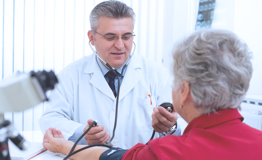HEART TRANSPLANT
Introduction to Heart Transplant
Heart transplant is a surgery in which a patient’s diseased heart is replaced with a healthy heart from a brain dead donor. This improves the quality of life of the patient and increases lifespan.
Most heart transplants are carried out on patients who have a possibility of end-stage heart failure, a condition in which the heart is severely damaged or weakened, and on people who have failed other treatment options.
Need for Heart Transplant
Conditions that may eventually require a heart transplant include:
Eligibility for Heart Transplant
A patient becomes eligible for a heart transplant if there has been zero or little response to all others forms of treatment. It begins with a comprehensive assessment of the patient, the underlying causes necessitating a transplant and pre-existing conditions.
The condition that necessitates a heart transplant is congestive heart failure, also known as weakening of the heart muscles.
Pre-Heart Transplant Evaluation
Once a patient has been identified for heart transplant surgery, the patient is put through screening tests aimed at determining their physical condition and ability to withstand a major surgical process.
Here are the tests a patient may be subjected to upon the doctor's discretion:
A special probe is passed over the chest, through which sound waves bounce back and generate a picture of the heart muscles.
This helps the doctor understand the maximum amount of oxygen the heart and lungs can provide to the muscles during sustained activity. This test is very useful in determining which patients will benefit most from a heart transplant.
This procedure is carried out to check the pressure in the right side of the heart. After numbing the area, a catheter is inserted into a vein in the neck or groin to measure pressure levels in the heart chambers and main blood vessels.
To determine the patient’s blood type and ascertain any pre-existing viral infections.
To understand abnormalities in the lungs as well as the size of the heart.
To determine lung function and oxygen-carrying abilities.
To ascertain blockages in the carotid and leg arteries. This non-invasive test uses an ultrasound probe.
To evaluate oral health.
To look at the blood vessels behind the eye as well as the overall eye health.
To ascertain psychological risk factors that can often lead to poor outcomes.
To ensure that infections don’t cause complications, certain vaccinations will be administered
Legal Requirements
The primary legislation, Transplantation of Human Organs ACT, was passed in 1994. As per this act, there are certain guidelines to be followed for receiving a transplant depending on the country of residence of the receiver or the state of life of donor. For more information, Visit the Legalities section of our website.
The Heart Transplant Process
Heart Transplants do have a fair share of risks. The risk of this procedure may include:
Complications of Heart Transplant
Heart Transplants do have a fair share of complications. The complications of this procedure may include:
- Primary Graft Failure (immediate)
- Delayed rejection
- Infections
- Issues related to Kidney due to immunosuppressants
- Weight Gain
Many of these problems are treatable, although sometimes another heart transplant may need to be carried out if necessary.
Post-Heart Transplant Procedure
There are Cardiac Rehabilitation Programmes to help ease the post-surgery recovery process. Patients will be counselled by the doctor on how to keep track of their overall health which includes monitoring – Weight, Blood Pressure, Pulse and Temperature. 
Patients also learn the signs of heart transplant rejection and infection. For the first three months after leaving the hospital, patients will return often for tests to check for infection or rejection of the new heart.
Life After Heart Transplant
The heart transplant can be a new lease of life for patients with end-stage heart diseases. But even after the transplant, there are certain precautions that need to be taken.
Organ transplant success stories
Success Rate and Life Expectancy of Heart Transplant
As medicine progresses, so does the life expectancy of patients undergoing heart transplant. There have been great strides taken in the last decade or two, which have increased the success rate and the life expectancy of patients.
Need Expert Advice?
Our consultants are here to help from
Mon – Fri 9am to 6pm ICT
Our service is free. You never pay us any fees or deposits. You only pay for the surgery and directly to the hospital.
















 Chat with us
Chat with us
 Chat with Us
Chat with Us